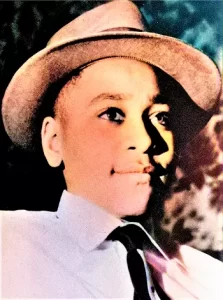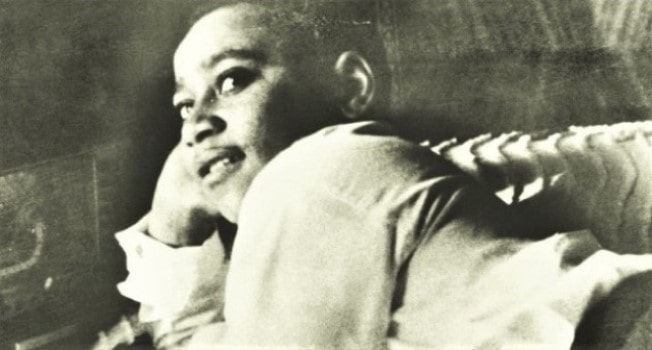Emmett Till was an African American boy who was brutally murdered for racial reasons in the town of Money, Mississippi. His death is remembered as one of the key events that strengthened the nascent US civil rights movement.
The main suspects were acquitted but later admitted that they had committed the crime. Till’s mother demanded a public funeral ceremony for the son, with the coffin open, so that everyone could see how the boy had been tortured and murdered: he had been beaten, his eye was pulled out, he was shot, and ‘they had finally thrown into the Tallahatchie River with a neck of a cotton gin (an instrument used for the processing of cotton) tied to the neck as ballast with barbed wire.
The corpse remained in the river for three days before being discovered and recovered by two fishermen. Till is buried in Burr Oak Cemetery in Alsip, Illinois. The investigation into his murder was officially reopened in May 2004, and as part of the investigation, the body was exhumed to perform an autopsy. The body was then buried again by the family.

Emmett Till Facts
- Born: July 25, 1941, in Argo, Illinois
- Age: 19 Years Old
- Known for: 14-year-old victim of a lynching, whose galvanized death of the civil rights movement
- Real Name: Emmett Louis Till
- Education: James McCosh Elementary School
- Parents: Mamie Till-Mobley and Louis Till
- Died: August 21, 1955, in Money, Mississippi
- Quotes “I thought about Emmett Till and I couldn’t go back My legs and feet didn’t hurt that a cliché I paid the same rate as others and I felt hurt I wasn’t going … back. ” -Pink park
Emmett Till Biography
Emmett Louis Till was born on July 25, 1941, in Argo, Illinois., A city outside of Chicago. He was born into a poor Christian family. Emmett Till’s mother, Mamie Till left his father, Louis Till when he was a baby. In 1945, until Mamie received word that Emmett’s father was killed in Italy.
They didn’t learn the exact circumstances until after Emmett’s death, when Mississippi Senator James O. Eastland, to reduce sympathy for Emmet’s mother, showed the press that he had been executed for rape.
In her book “Death of Innocence: The History of Hate Crimes That Changes America” Till’s mother, Mamie Till-Mobley, tells of her son’s childhood. He spent his early years surrounded by a large family. When he was 6 years old he developed polio. Although he is recovering, she left him with a stutter that he struggled to overcome during his youth.
ALSO READ | Rosa Parks Story, Bus Boycott, Children, Facts & Quotes
Emmett Till Childhood
Mamie and Emmett spent some time in Detroit but moved to Chicago when Emmett was about 10. She had remarried at this point but left her husband when she learned of his infidelity.
Mamie Till describes Emmett as adventurous and independent, even when he is a small child. An incident when Emmett was 11 also shows his courage. Marnie’s husband still came from her house and threatened her. Emmett stood by him, a butcher knife grabbed his mother to defend if necessary.
Youth
Through his mother’s account, Emmett was a responsible young man as a youth and teenager. He often took around the house while his mother was at work. Mamie Till called her son “meticulous”. He was proud of his looks and figured out a way to steam his clothes on the cooler.
But he also had time for fun. He loved music and enjoyed dancing. He had a strong group of friends back in Argo that he would take the tram to see on weekends.
And like all children, he dreamed of his future. Emmett once told his mother that when he grew up he wanted to be a motorcycle policeman. He told another relative he wanted to be a baseball player.
Trip to Mississippi
Until the mother’s family was from Mississippi and she still had family there, and an uncle, Moses Wright. When he was 14, he went on a trip to see his relatives there during his summer vacation.
Until, cities in or around Chicago and Detroit had spent his entire life with it, which were separate but not by law. Northern cities like Chicago were separated because of the social and economic consequences of discrimination. As such, they do not have to relate to the same kind of refused to go to Mississippi and insisted that her son’s body related to races found in the south.
Emmett’s mother warned him that the south was a different environment. She warned him “be careful” and “humiliate yourself” the whites in Mississippi if necessary. Accompanied by his 16-year-old cousin Wheeler Parker Jr., Bis in Geld, Mississippi, came on August 21, 1955.
Before Emmet Till Brutal Murder
On Wednesday, August 24, Till and seven or eight cousins went from Bryant Grocery and Fishmarket, a white proprietary store that sells mostly merchandise to African-American sharecroppers in the area. Carolyn Bryant, a 21-year-old white woman, works at the cash register while her husband, a trucker, was on the street.
Emmett and his cousins were chatting in the parking lot and Emmett, in a youthful boast, boasted to his cousins that he had a white girlfriend back in Chicago. What happened next is unclear. His cousins disagree if anyone dares Emmett to go to the store and get a date with Carolyn.
Emmett did, however, go to the store and bought chewing gum. To what extent he tries to flirt with Carolyn is also unclear. Carolyn changed her story several times at different times, suggesting that he said, “Bye, baby,

